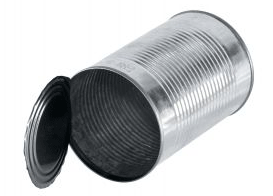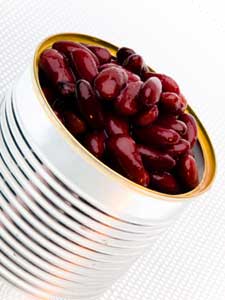 It looks like BPA strikes again and this time our canned tomatoes and beans are under attack.
It looks like BPA strikes again and this time our canned tomatoes and beans are under attack.
Just a few years ago bisphenol-A, or BPA, a toxic chemical that has been linked to biological problems and developmental problems in the young, was found in many popular reusable water bottles and baby bottles. This discovery gained lots of attention and called for a major change in the manufacturing of many products.
Now it is being found that the lining of most cans contains a resin that can pick up the toxin BPA. Canned tomatoes are more susceptible due to their acidic properties; the acid increases the rate at which BPA is absorbed into food. This is found to be true for canned soda and canned beans as well.
The risk that this poses is argued to be significant, especially for children under the age of six. Due to their smaller size, the levels of BPA that children are exposed to is higher than that of adults. Children also metabolize BPA slower therefore the toxins stay in their systems longer causing a higher risk for damage to their developing bodies.
So what is one to do? Canned tomatoes and beans are often boasted as great options for many healthy recipes. Canned tomatoes are an excellent ingredient for winter soups, especially when fresh tomatoes are out of season. The garden treat is full of many wonderful nutrients that are beneficial to the body. Beans are also a great resource throughout the year. They are full of fiber, loaded with protein, and very low in fat and cholesterol. When these items are readily available in a can, they can make preparing a healthy meal so much easier (and cheaper).
 If one is trying to get away from the canned versions of these foods, there are options. Tomatoes can be found in glass jars. One could can their own tomatoes while they’re in season and have them available for the winter months. Dried beans are not as convenient, but they are an inexpensive alternative to the canned version.
If one is trying to get away from the canned versions of these foods, there are options. Tomatoes can be found in glass jars. One could can their own tomatoes while they’re in season and have them available for the winter months. Dried beans are not as convenient, but they are an inexpensive alternative to the canned version.
Many find food tastes better when it doesn’t come from a can. Whether it’s from a glass jar or a bag, there’s no metallic taste that a canned food can present.
If these options still seem like too much work, and you’re over the age of six, it’s quite possible that the levels of BPA are actually low enough that you’ll be just fine to keep using the canned food. The effects seem to be mild at most.
When these elements are discovered in our food, it’s wise to inform yourself. It’s also wise to count the costs. What is the lesser of two evils? Possibly being impacted by a chemical or missing out on excellent nutrients from healthy foods? Hopefully in the future, BPA can be eliminated completely from our food and drink containers- or at least just attack the foods we shouldn’t eat anyways.
Via: Summertomato.com
Also Read:
